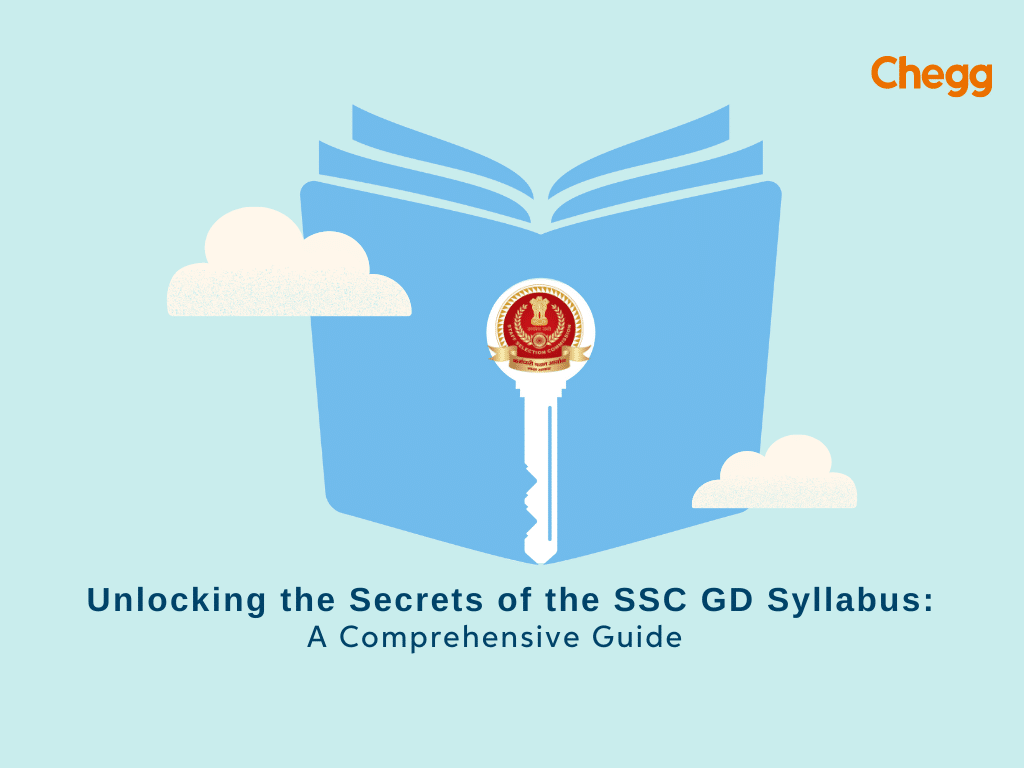SSC GD Syllabus 2024: Detailed Subject Wise Topics

Table of Contents
Table of Contents
Looking for a detailed guide on SSC GD Syllabus? Look no further. We’ve got you! This blog post helps you understand the SSC GD Syllabus better. This framework of the examination plays a vital role in your preparation.
SSC General Constable Duty exams attract millions of people each year. SSC full forms means the Staff Selection Commission which conducts the GD exam for SSC of India once a year. Through this SSC GD exam 2024, you can get into various posts, some of which are listed below. SSC Job Post listed below are:
- Border Security Forces
- Central Railway Police Force
- Indo-Tibetan Border Police
As you would’ve understood by now, the SSC GD full form means the Staff Selection Commission General Duty (SSC GD) exam offers a career opportunity in the defence sector and offer a lucrative salary. You must clearly understand the exam pattern and syllabus of SSC GD Recruitment 2024.

SSC GD Syllabus 2024: Subject-Wise Topics
The SSC General Duty exam 2024 comprises four sections, as listed below.
SSC GD Syllabus for Reasoning
The General Intelligence and Reasoning syllabus of SSC GD evaluates critical thinking and problem-solving abilities. The curriculum covers a variety of themes. The following are some of the Reasoning SSC GD subjects:
- Arithmetic number series
- Relationship ideas
- Similarities and differences
- Non-verbal series
- Visual memory
- Discrimination
- Coding and decoding
- Observation
- Analogies
- Spatial visualization
- Spatial orientation
- Arithmetical reasoning and figural classification
- Figural Classification
SSC GD Syllabus for General Knowledge and General Awareness
This section evaluates SSC GD general knowledge and current affairs awareness syllabus. It includes questions related to the topics listed below.
- Sports
- History
- India and its neighbouring countries
- Culture
- Geography
- Economics
- General policy
- Indian constitution
- Scientific research
- Current affairs.
SSC GD Syllabus for Maths
Elementary Maths assesses the understanding of basic maths concepts. The following topics are a part of this subject.
- Number systems
- Computation of whole numbers
- Decimals
- Fractions
- Problems related to numbers
- Relationship between Numbers
- Fundamental arithmetical operations
- Percentages
- Ratio and Proportion
- Averages
- Interest
- Profit and Loss
- Discount
- Mensuration
- Time and Distance
- Ratio and Time
- Time and Work
SSC GD Syllabus for English
This section evaluates the understanding of basic English or Hindi grammar and vocabulary. The syllabus includes the topics listed below.
- Spotting errors
- Filling in the blanks
- Synonyms or homonyms
- Antonyms
- Idioms
- Phrase Replacement
- Cloze Test
- Spellings
- One Word Substitution
- Reading comprehension
SSC GD Syllabus for Hindi
This section will be only in Hindi language to assess the candidate’s knowledge for the language. The topics covered SSC GD subjects are:
- संधि और संधि विच्छेद
- उपसर्ग
- प्रत्यय
- पर्यायवाची शब्द
- मुहावरे और लोकोक्तियाँ
- सामासिक पदों की रचना और समास विग्रह
- विपरीतार्थक (विलोम) शब्द
- शब्द-युग्म
- वाक्यांश के लिए एक सार्थक शब्द
- संज्ञा शब्दों से विशेषण बनाना
- अनेकार्थक शब्द
- वाक्य-शुद्धि : अशुद्ध वाक्यों का शुद्धिकरण और वाक्यगत अशुद्धि का कारण
- वाच्य : कर्तृवाच्य, कर्मवाच्य और भाववाच्य प्रयोग
- क्रिया : सकर्मक, अकर्मक और पूर्वकालिक क्रियाएँ
- शब्द-शुद्धि : अशुद्ध शब्दों का शुद्धिकरण और शब्दगत अशुद्धि का कारण
- अंग्रेजी के पारिभाषिक (तकनीकी) शब्दों के समानार्थक हिंदी शब्द
- सरल, संयुक्त और मिश्र अंग्रेजी वाक्यों का हिंदी में रूपांतरण और हिंदी वाक्यों का अंग्रेजी में रूपांतरण
- कार्यालयी पत्रों से संबंधित ज्ञान

SSC GD Exam Pattern 2024
The SSC GD Constable Tier 1 test will be conducted online, with multiple-choice questions. The CBT test consists of four sections with a total of 80 questions and a time limit of 60 minutes. Every wrong answer result in a 0.25-point deduction. The Computer Based Examination (CBE) is held in English, Hindi, and 13 regional languages, including Assamese, Bengali, Gujarati, Kannada, Konkani, Malayalam, Manipuri, Marathi, Odia, Punjabi, Tamil, Telugu, and Urdu.
| Subject | No. of Questions | Maximum Marks |
| General Intelligence & Reasoning | 20 | 40 |
| General Knowledge & General Awareness | 20 | 40 |
| Elementary Mathematics | 20 | 40 |
| English/ Hindi | 20 | 40 |
| Total | 80 | 160 |
SSC GD Constable PET Details
Candidates who score more than the cut-off marks for the SSC GD Online exam will be qualified to take the Physical Efficiency Test, for which the SSC has defined norms.
For the Physical Efficiency Test (PET)
| Type | For Male Candidates | For Female Candidates |
| Candidates other than Ladakh Region | 5 km in 24 minutes | 1.6 Km in 8½ minutes |
| For Ladakh Region | 1.6 Km in 7 minutes | 800 meters in 5 minutes |
SSC GD Constable PST Details
The PET will be followed by the Physical Standard Test, which will shortlist candidates based on physical criteria such as height, chest size, and vision. Candidates who pass this step will be invited for a medical examination. The details were mentioned below:
Minimum Height Required for SSC GD Constable Exam for both Male and Female Candidates
| Minimum Height Required | For Male Candidates | For Female Candidates |
| General, SC & OBC | 170 | 157 |
| Scheduled Tribes | 162.5 | 150 |
| Schedule Tribe candidates hailing from the North-Eastern States of Arunachal Pradesh, Manipur, Meghalaya, Mizoram, Nagaland, Sikkim & Tripura and Naxal/ Left Wing Extremism affected districts | 160 | 147.5 |
| Candidates hailing from the North-Eastern States of Arunachal Pradesh, Manipur, Meghalaya, Mizoram, Nagaland, Sikkim & Tripura | 162.5 | 152.5 |
| Candidates falling in the categories of Garhwalis, Kumaonis, Dogras, Marathas and candidates belonging to the States of Assam, Himachal Pradesh and Jammu & Kashmir | 165 | 155 |
Minimum Chest Required for SSC GD Constable Exam for both Male and Female Candidates:
| Minimum Chest Required | Male Candidates | Female Candidates |
| General, SC & OBC | 80/ 5 | N/A |
| Scheduled Tribes | 76 / 5 | N/A |
| Garhwalis, Kumaonis, Dogras, Marathas and candidates belonging to the States of Assam, Himachal Pradesh and Jammu & Kashmir | 78 / 5 | N/A |
| Candidates hailing from North Eastern States of Arunachal Pradesh, Manipur, Meghalaya, Mizoram, Nagaland, Sikkim and Tripura | 77 / 5 | N/A |
SSC GD Selection Process 2024
To be qualified and shortlisted for the vacancies, candidates must complete each stage of the selection process, which is detailed below.
- Written examination
- Physical Efficiency Test (PET) and Physical Standard Test (PST)
- Medical Test
SSC GD Constable 2024 Preparation Tips
Sketch a simple strategy to perform well in the exam because an organised approach reduces confusion. The following tips would help in performing well in the exam.
- Familiarise yourself with the paper pattern and syllabus. Each section carries equal weight. That is 25 questions and 25 marks for each section.
- Create a detailed study plan. Stick to it.
- Each section carries equal weight. That is 25 questions and 25 marks for each section.
- The General Knowledge and General Awareness section is the most critical one. It determines the preparation strategy of every aspirant.
- Experts tell aspirants to improve their knowledge of current affairs and general knowledge. This helps in excelling in this section.
- Check your performance every day. Identify your weaker subjects and work on those. Previous year’s question papers can help with this task.
- Manage time to ensure you can attempt all the questions within the allotted period.
Preparation strategies based on SSC GD Syllabus
You must follow an organised approach while preparing for the SSC GD exam. Check out these strategies. They are based on the syllabus for SSC GD test 2024.
- Solve puzzles, series and coding decoding problems to practice General Intelligence and Reasoning.
- Read newspapers and current affairs magazines to stay updated with General Awareness.
- Practice basic arithmetic, geometry, mensuration, and data interpretation to master Elementary Maths.
- Take previous years’ question papers and mock tests to understand the exam pattern.
- Identify strengths and weaknesses in each section and improve the weak areas.
- Revise every day.
- Stay focused and positive. Take care of your physical and mental health to prevent burnout.
SSC GD Syllabus Books Study Materials and Resources
Here are a few study materials and resources for the SSC GD exam. Experts recommend these books and courses.
- SSC GD constable guide by Disha Experts.
- SSC GD Constable Solved Papers by Kiran Prakashan.
- RPH Editorial Board’s SSC GD Constable Book.
- SSC GD Constable Exam Guide by Arihant Experts.
- SSC GD Constable Online Course by Testbook.
Also, read: Top 5 Must-Read SSC GD Books for Comprehensive Exam Preparation.
Time Management Techniques for Optimal Performance
Time management is crucial during the SSC GD recruitment . Here are a few time techniques for optimal performance.
- Analyse the exam pattern and allot time.
- Avoid spending too much time on a single question.
- Solve the easier questions first to save time.
- Keep track of time. Furthermore, ensure that you complete the exam within the allotted time.
Previous year’s question papers based on the SSC GD Syllabus
Students for the SSC GD exam get help from solving the previous year’s question papers. Here are the advantages of using these papers.
- Valuable insight into the exam pattern and the type of questions asked.
- Helps to understand the weightage of topics in the exam. This helps in crafting a better preparation strategy.
- Practice as many mock papers as possible. This will give them a detailed understanding of the exam.
- Regular practice of these papers helps develop time management techniques and strategies.
- Mock tests and sample papers provide a simulation of the actual exam. This helps people in getting the hang of the exam environment.
- The papers give an idea of the difficulty level of the questions. Aspirants must prepare accordingly.
People must have the desired clarity to succeed in the SSC GD examination 2024. Taking the right steps will help in achieving their career goals. They must properly understand the SSc GD syllabus, exam pattern, and weight of topics.
Strengthening your basics and developing effective time management and problem-solving strategies is important. Previous years’ question papers and mock tests are valuable insights. They prepare people for the exam. With consistent effort and practice, any aspirant can clear the tests.
Frequently Asked Questions (FAQs)
What are the passing marks in SSC GD?
The passing marks for the SSC GD examination are the following:
35% for General and Ex-Servicemen
33% for SC, ST or OBC people
What are the subjects in SSC GD?
The SSC GD examination consists of four subjects as follows.
1.) General Intelligence and Reasoning
2.) General Knowledge and General Awareness
3.) Elementary Maths
4.) English or Hindi
What is SSC GD Height Eligibility?
The height eligibility for men is 170 cm. For women, it is 157 cm. Height relaxation applies to certain categories as per the rules.
Is there any negative marking in the SSC GD Constable exam?
Yes, for each wrong answer, 0.25 of a mark is deducted.
How many questions will be there in SSC GD online exam?
There are 100 questions in all across four sections of the SSC GD online exam.